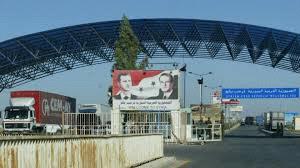Ammon News - AMMONNEWS - The Syrian opposition has tabled five conditions to be met before the Nasib border crossing between Jordan and Syria can be re-opened.
The crossing is currently controlled by four Free Syrian Army (FSA) factions: Falawaja Hawran, the Yarmouk Army, the Sunni Lions and Fawj Al-Madfaiah.
Jordan closed the crossing in April 2015 due to what then-Jordanian Interior Minister Hussein Al-Majali described as “acts of violence on the Syrian side.”
Arab News has learned from FSA representatives and local councils in the nearby city of Daraa that talks on the re-opening of the crossing were recently held between the FSA and civil institutions affiliated with the opposition on one side and the Syrian regime on the other.
Those talks were apparently mediated by Jordan and took place between early September and early October, at which point the opposition requested a month in order to come up with a proposal to present.
Mohammed Al-Sawalima, head of Daraa’s local council, told Arab News that the opposition set five conditions for the re-opening of the crossing.
“First, releasing all political prisoners in the regime’s prisons; second, flying the Syrian revolution’s flag at the crossing; third having Daraa provincial council supervise the work at the crossing; fourth, the return of the displaced to their cities and villages in Daraa governorate while lifting the siege on Ghouta and Homs; and fifth, rejecting any Syrian regime or Russian presence at the crossing.”
Arab News learned from members of the Syrian military opposition that Jordan suggested that the crossing should remain under the Syrian opposition’s control as a transit point for commodities, while moving the actual customs office to the regime-held town of Khirbet Ghazaleh just north of the crossing.
Brig. Gen. Ahmad Rahal, who defected from the Syrian regime, told Arab News that the FSA is facing a difficult choice.
“While the FSA has made great sacrifices in the south, which cannot be disregarded, it is subject to regional and international pressure in order for the crossing to be opened without anything (being offered) in return.”
He added that another possible scenario was for the crossing to remain in FSA hands “while the legal procedures will be performed by civilian employees appointed by the Syrian regime, in exchange for a percentage of fees that the FSA obtains. Jordan is pressuring the factions to accept this solution.”
The Syrian opposition rejected the first scenario, according to Raed Radi, commander of Falawaja Hawran.
“The crossing will not be opened this way,” he told Arab News. “This will not happen unless the principles of the revolution are preserved, Syrian detainees are released unconditionally, the displaced return to their occupied villages, and unless the crossing is managed by a civilian administration affiliated with the Daraa provincial council.”
Mussa Al-Zu’bi, director of the studies and projects office in Daraa told Arab News that no decision had yet been taken.
Consultations are taking place with all parties in southern Syria, in parallel with the meetings that are led by Jordan, in the hope of structuring the opposition’s proposal.
The first meeting brought together the members of Daraa’s executive bureau and was extended to include all 40 members of the provincial council. They then met with military commanders and several revolutionaries, activists, media professionals, members, and civilians.
An extended meeting was held later, to which all provincial councils in western Daraa were invited, and a similar meeting with local councils took place in eastern Daraa.
“In theory, there is a will to re-open the crossing provided that the constants of the revolution are preserved,” Al-Zu’bi said. “Some preconditions will be drafted to be discussed in the next few days during the talks with Jordan.”
Speaking on the sidelines of an Arab Forum seminar in Amman on Oct. 7, the Syrian Chargé d’Affaires to Jordan, Ayman Alloush, told Arab News: “Their conditions will not make any difference. It is non-negotiable in any way. The opposition’s talk regarding its presence at the crossings is merely (troublemaking).”
Abdul Salam Al-Diabat, chairman of the Chamber of Commerce in the Jordanian city of Ramtha, 10 km away from Daraa, explained the economic importance of the crossing.
“Prior to 2011, trade volume between Jordan and Syria amounted to nearly 350 million dinars ($490 million) per year. But it has hit zero following the closure of the Nasib crossing.
“Food and basic commodities are smuggled from the regime-held areas, and are sold at double the price on the southern Syrian market,” he continued. “Opening the crossing will result in reduced prices for our people.”
*Arab News
